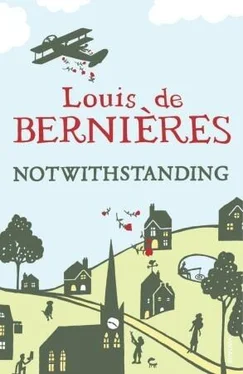Below the convent was common land, containing a sandpit which must have been the remains of a small quarry and steep paths which were ideal for tobogganing. I have lovely memories of racing my mother and the dog down the hill, whooping with delight. My mother had huge furry mittens that I used to press to my cheek, and sometimes she went out on our walks with a trowel and a small sack so that she could collect the horse droppings for her roses. In those days the common was deep in flourishing bracken, which was ideal for hideouts. It was also ideal for courting couples, but it has now been reverted to heath by a new generation of eco-purists. Beyond, through a pinewood, was Sweetwater Lake, ringed by rhododendrons, still and silent, where I poached in vain for the rumoured trout, until I was caught by Colonel Redhead, who let me off because I had a proper fishing rod and hadn’t broken off any branches. Behind the gypsies’ scrapyard, extending all the way to Chiddingfold, was the Hurst, a very old wood full of mysterious pools and hummocks. It had a disused road that reminded me of Kipling’s poem, except that it has never disappeared.
And now I begin to realise why, despite my better judgement, I cannot help looking back on it all as a rural idyll. The old social structure had gone, along with the old trades, but the countryside was intact. Because we had an inflexible family rule that the dog must be walked daily, I was out in the woods and fields every single day that I was at home. I discovered all sorts of secret places that will remain secret. I know where the bluebells and kingcups are. There is a sandpit where, infected yet baulked by the spirit of Wordsworth, I wrote my first bad poems while the dog sighed with boredom next to me. The Hurst was muddy and bewildering, but I got to know every inch of it. I know where the wild strawberries are.
Initially I decided to call this village Notwithstanding because for a long time I felt that it had not withstood. I was quite wrong about that. I had been disgusted by someone telling me not to throw sticks into the pond for the dog because it might frighten the ducks, and by some newcomer protesting about the calling of cockerels in the morning, and so I had begun to think that all was lost.
However, there really are one or two old families left. The village still looks exactly the same; there is still the Cricket Green Stores, a pond, a school, a pub, a disused pound, a village hall, cricket on the green. The cricketers still wear whites. The villagers planted trees to celebrate the millennium, the same as every other village. After all these years of accumulating the stories herein, I have grown fond of the name. It reminds me of the strange names of other English villages, and, after all, anyone who wishes to know the real name can work it out.
What has not withstood is the population. Most of the people I knew are dead, because I was young then.
I was at a salon du livre in Pau a few years ago, when I met a French artist called Jacques. He told me that he adored Britain, because it was so exotic. I was dumbfounded and asked him what he meant. He replied that if he went to Germany, or France, or Belgium, or Holland, they all seemed the same. But ‘ La Grande Bretagne, c’est un asile immense .’ On reflection I realised that I had set so many of my novels and stories abroad, because custom had prevented me from seeing how exotic my own country is. Britain really is an immense lunatic asylum. That is one of the things that distinguishes us among the nations. We have a very flexible conception of normality. We are rigid and formal in some ways, but we believe in the right to eccentricity, as long as the eccentricities are large enough. We are not so tolerant of small ones. Woe betide you if you hold your knife incorrectly, but good luck to you if you wear a loincloth and live up a tree.
I began to write these stories, only to be flummoxed by Tim Pears, who, in 1993, and very much under the influence of the same Latin American writers who had influenced me, published In the Place of Fallen Leaves . It is a beautiful book, set in the English countryside, which will one day be considered a classic. I wrote to him saying something like ‘A pox upon you, varlet, you’ve written the book I was just about to write’, and he replied, ‘I’ll keep England if you keep abroad.’ In the front of my copy he wrote: ‘To Louis, fortunately busy abroad.’ I have stuck to this agreement until now, and I hope that Tim forgives me for breaking it at last. His book obliged me to approach mine differently, but I hope that it is worthy to be somewhere near his on the shelf.
These days I live in a village in Norfolk, a place where there was only recently a man who lived in the woods with his animals. There is someone else who is a crack shot with a shotgun even though he has only one arm. This village is closer to its past. The dialect and accent just about survive. The names on the graves and war memorials are the names of families who still live here. I hope that one day my son and daughter will feel the same way about their childhood village in Norfolk as I do about mine in Surrey. In these stories I celebrate the quirky people I remember: the belligerent spinsters, the naked generals, the fudge-makers, the people who talked to spiders. I have not written what did happen, but what might or could or should have happened, and at one point I have ventured into a more distant past. Some of the stories I heard turned out to be false, as village rumours often are, but I kept them anyway. The moment I began to write I found that my instinct for fiction rapidly overwhelmed my respect for the truth, so that this village might be any village at all. Either way, the literary truth lies not in the details, but in the flavour.
The invisible background, of course, remains precisely that. I mean the imminent prospect of nuclear annihilation, the industrial strife, the inflation, the class warfare, the threat of petrol rationing, the terrorist bombs and the destructive ‘generation gap’ which meant that children no longer wanted to be like their parents, and parents felt hurt and bewildered. Literary writing then, as now, was almost entirely metropolitan. I don’t mourn these things, any more than I mourn the discontinuation of death by appendicitis. I mourn the people, and I mourn my lost youth, which I entirely wasted through not having enough fun.
I have refused to romanticise the countryside in the sentimental way that seems obligatory in England. After all, the first things that strike you upon coming back from living in a town for any number of years, is the truly shocking amount of roadkill, and the late-winter horror of myxomatosis. Those who grow up loving the countryside do so in the same way as they grow to love their parents. I have aimed to capture the feeling of the times, and I do so remembering not so much the village as those who have been translated into the graveyard of St Peter’s Church, and would otherwise have been forgotten. May they not rest, but live. Inter alia: Mrs Booth, Martin Carroe, Connie and Cecil Chapman, the Churchills, Rev. Elton and Eileen, Molly Gabb, John the Gardener, Bernard Grillo, Sybil Harcourt-Clark, Alan Harper, Joan Herman, Mrs Hopkins, Molly Hyde, Lavander, Dr Strang McClay, Alan, Douglas and Brenda Maclachlan, Major John Major, Mrs Marriage, General Martin and Jean, Beetle and Tony Nation, the Nicholls, Mary Parker (memoirist of the village, and fellow Morris Minor driver), Peggy, Mrs Robertson (who once spent several days in the bath), Dicken and Ruth Steele, Trotty and Ted Sutton, Rev. David Thompson, Jack Thorn, Buzz Walford, Dennis Wieler, Beryl Williams, Yeoli and Kit Wilson. And Eric Parker, soldier, village patriot, indefatigably enthusiastic naturalist, and literary father of the village. I wish I had known him.
Читать дальше












